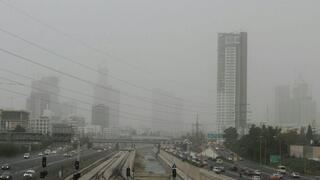The government has submitted Israel's first-ever biennial transparency report (BTR) under the UN Climate Convention , reflecting the country's progress in addressing the climate crisis. As expected, the report, published on Wednesday, reveals that progress is insufficient. At the current pace of implementing greenhouse gas emission reduction programs, Israel is projected to achieve only a 19% reduction by 2030—far short of the 27% target it committed to in international agreements.
2 View gallery Air pollution in Tel Aviv ( Photo: Ido Erez ) The Ministry of Environmental Protection, which prepared the report with the assistance of EcoTraders—a leading environmental and energy management advisory involved in drafting the national energy efficiency plan and in emissions trading for various private companies and government ministries—claims that the gap can be closed, and targets can even be surpassed, provided that key measures are implemented immediately. These are the key recommendations: Accelerating the production of renewable energy to reach 30% of total electricity generation by the end of the decade. Setting stricter emission standards for new vehicles.

Expanding tax incentives for electric vehicles. Increasing the number of charging stations. Encouraging the use of public transportation and reducing private vehicle usage.
Establishing clear guidelines for methane gas collection and combustion at landfills. Investing in infrastructure for waste sorting and recycling. The report, published one day after Earth Day, highlights the intensifying impact of climate change in the Middle East.
Israel has experienced record dry winters and droughts in recent years. To prepare for worsening climate conditions, comprehensive planning and funding are required from all government ministries and local authorities. While some progress has been made—such as the development of a national climate adaptation plan and local authority initiatives—many local governments lack funding or the capacity to advance plans that have already been written.
Additionally, there is an urgent need to complete the mapping of climate risks in Israel to obtain an accurate picture of the challenges ahead. Achievements and concerns One key achievement mentioned in the report is the reduction in coal use. In 2022, Israel emitted approximately 81 million tons of greenhouse gases—a 0.
4% increase compared to 2015, despite electricity consumption doubling. This was achieved through policies aimed at reducing the load on coal-fired power plants, leading to a 43% decrease in coal consumption, the most polluting fuel source. The share of electricity generated from renewable energy rose from almost 0% in 2015 to about 10% in 2022.
However, when using 2000 as the baseline, emissions have actually increased by 15%. 2 View gallery ( Photo: shutterstock ) The report also notes that the government and the Knesset have approved a carbon tax framework for the first time, partially addressing the environmental and health damage costs through excise taxes. However, it does not yet fully reflect all costs, particularly concerning the use of natural gas.
Get the Ynetnews app on your smartphone: Google Play : https://bit.ly/4eJ37pE | Apple App Store : https://bit.ly/3ZL7iNv The Ministry of Environmental Protection emphasizes that the Climate Law, which is still awaiting final approval, along with adequate funding for local authorities, is essential for meeting climate goals.
Additional measures deemed necessary include promoting electric transportation through tax benefits and infrastructure investment, and developing sustainable transportation infrastructure to replace private vehicle use. The ministry asserts that achieving the targets is possible but depends on the immediate implementation of necessary measures. These steps would improve air quality, enhance public health, reduce living costs, strengthen energy security and create opportunities for developing Israeli technological solutions that could drive the local and global economy forward.
At the same time, the Ministry of Energy presented a draft of its climate adaptation plan for the energy sector, which is open for public comments. The plan focuses on developing land-based alternatives for gas in emergency situations, given the sensitive location of offshore gas rigs; expanding strategic fuel storage; and encouraging the use of renewable fuels. In the water sector, the draft proposes developing a plan to address potential declines in supply, emphasizing efficient consumption and waste prevention.
>.
Environment

Israel's climate goals fall short: Government report reveals gaps

Israel's first biennial climate report warns of insufficient progress toward emission reduction goals; With a projected 19% cut by 2030—below the 27% target—immediate action is needed on renewable energy, electric transportation, waste management and climate adaptation initiatives















